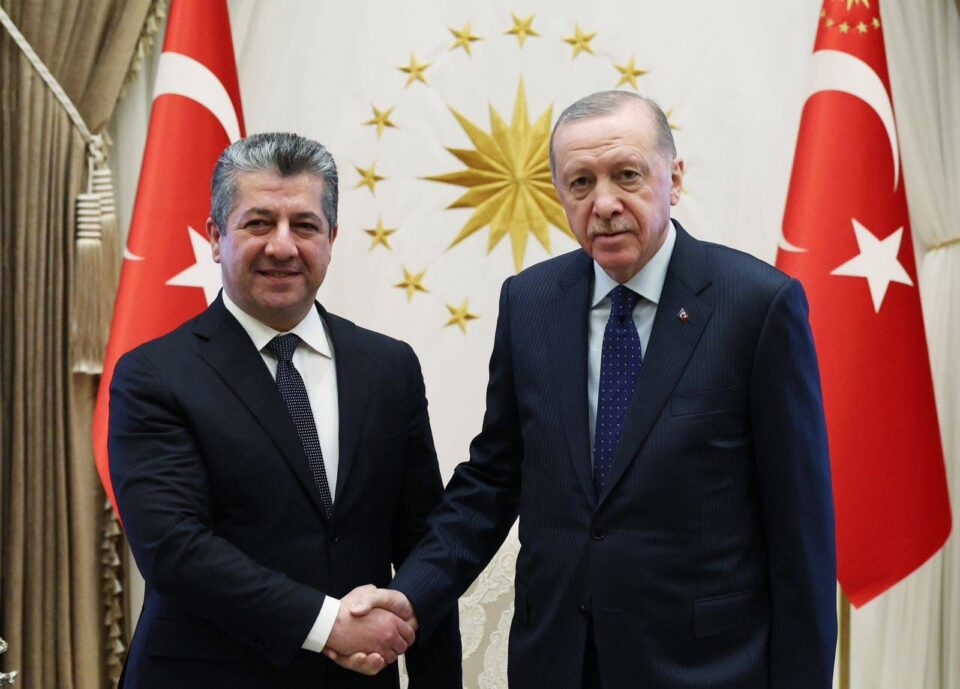Kurdistan PM and Turkish President strengthen ties amid geopolitical shifts
Kurdistan Regional Government (KRG) Prime Minister Masrour Barzani engaged in pivotal diplomatic meetings with Turkish President Recep Tayyip Erdogan and Foreign Minister Hakan Fidan in Ankara on January 7, 2025, marking a significant step in regional diplomacy amid rapidly evolving Middle Eastern dynamics.
Following his meeting with President Erdogan at the Presidential Palace, PM Barzani took to X platform, stating: “I am pleased to meet with President @RTErdogan in Ankara today. We discussed ways to promote dialogue and a common understanding to navigate through the developments in the Middle East, including in Syria.” Later, after his meeting with the Foreign Minister, he added: “Today in Ankara, I met with FM @HakanFidan. We exchanged views on recent developments in Iraq, Syria, and beyond, and ways to deepen trade and investment ties between the Kurdistan Region of Iraq and Türkiye, including in energy.”
Speaking to The Kurdish Globe, Dr. Muhammad Saleh, University Lecturer and Political Analyst, emphasized the complexity of the visit’s timing. “The confrontations between Israel and Iran, developments in Lebanon, Gaza, Yemen, and most importantly the recent developments in Syria after the fall of Bashar regime have put the whole region in a critical stage,” he said. “Almost all political actors in the region and beyond have their agenda and fears for the future of the region, which directly or indirectly involves KRG, or Iraqi Kurds as well.”
Political analyst Dr. Hassan Ahmed Mustafa, in an exclusive interview with The Kurdish Globe, described the visit as a “diplomatic and strategic turning point.” He elaborated on the military and political dimensions: “Over 100,000 Kurdish fighters, with NATO and U.S. support, have not only held thousands of ISIS prisoners but have also played a crucial role in defeating ISIL alongside the international coalition. This military and political presence has been a source of tension for Turkey, which views it as a threat to its national security and territorial integrity, especially given the backing from the United States.”
The Turkish media’s extensive coverage reflected the visit’s significance. Çetiner Çetin, Security Policy Manager at Haberturk newspaper, stated: “The reception of Masrour Barzani by President Erdogan and Foreign Minister Fidan sends an important message indicating that a Middle Eastern guest is in his own home. By welcoming Barzani into their own home, Turkey’s President and Foreign Minister wanted to show that they are under one roof and in this house, they will solve the issues of Kurds together.”
Dr. Nadia Talat Said, Dean of the Makhmour College of Education, emphasized the economic dimensions in her analysis saying: “Turkey is one of the main trading partners of the Kurdistan Region, as both sides rely on each other in exports and their shared border is very active in trade movement. The Kurdistan Region heavily relies on exports through Turkey, especially regarding oil and gas, and perhaps the visit aims to increase cooperation in the energy sector, particularly with projects related to oil and gas transportation to global markets through Turkey.”
Dr. Mustafa further elaborated on the energy aspect: “Strengthening economic ties between the Kurdistan Region and Turkey is one of the main objectives of this visit. The Kurdistan Region has prior experience exporting its oil in partnership with Turkey, a move that previously led to friction between Turkey and Iraq. The renewal and securing of a new energy agreement is critical not only for the economic stability of the Kurdistan Region but also for Iraq as a whole.”
Dr. Saleh warned about the delicate balance required in regional politics: “Iraqi Kurds can benefit from the developments of the region, keeping the balance and biding their time. However, falling into the trap of siding with a regional block and helping in implementing its agenda against the other can possibly end in catastrophe.” He emphasized the diplomatic value of such high-level meetings: “In such meetings, KRG officials can first-hand hear the stance, concerns, plans, and demands of the main political actors of the region and similarly make KRG’s voices and concerns heard.”
The Turkish Presidency’s statement emphasized that “during the meeting, emphasis was placed on Iraq’s stability and security, and both sides are trying to prevent Syria’s developments from causing further instability in the region.” This aligns with Dr. Mustafa’s observation that “the fall of Assad has brought profound changes to the geopolitical landscape in the region. Many parties in the region are now candidates to become victims of these changes. The Iranian front, for instance, has retreated in Syria, Lebanon, and Gaza.”`
Looking forward, Dr. Mustafa concluded to The Kurdish Globe: “The Kurdistan Region believes that any state in Turkey or Iran that acts as an honest ally of the Kurds can play a major role in the region. We support constructive dialogue between the parties and the Kurds to ensure mutual understanding and progress.”
As the Middle East continues to experience significant transformations, this high-level engagement between Erbil and Ankara represents a crucial step in regional diplomacy. The visit underscores the KRG’s growing role as a stabilizing force in an increasingly complex regional landscape while highlighting the importance of maintaining balanced relationships with key regional powers.
The Kurdish Globe

